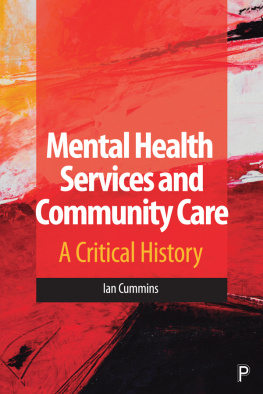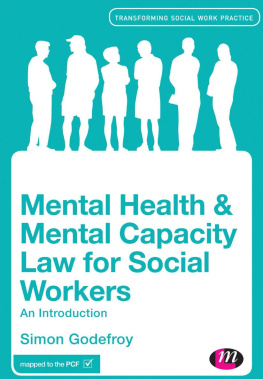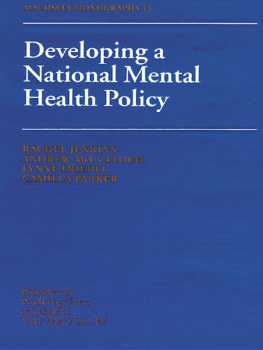MENTAL HEALTH SOCIAL
WORK REIMAGINED
Ian Cummins
First published in Great Britain in 2019 by
Policy Press University of Bristol 1-9 Old Park Hill Bristol BS2 8BB UK Tel +44 (0)117 954 5940 e-mail
North American office: Policy Press c/o The University of Chicago Press 1427 East 60th Street Chicago, IL 60637, USA t: +1 773 702 7700 f: +1 773-702-9756 e:
Policy Press 2019
British Library Cataloguing in Publication Data
A catalogue record for this book is available from the British Library
Library of Congress Cataloging-in-Publication Data
A catalog record for this book has been requested
ISBN 978-1-4473-3561-0 paperback
ISBN 978-1-4473-3559-7 hardcover
ISBN 978-1-4473-3562-7 ePub
ISBN 978-1-4473-3563-4 Mobi
ISBN 978-1-4473-3560-3 ePdf
The right of Ian Cummins to be identified as author of this work has been asserted by him in accordance with the Copyright, Designs and Patents Act 1988.
All rights reserved: no part of this publication may be reproduced, stored in a retrieval system, or transmitted in any form or by any means, electronic, mechanical, photocopying, recording, or otherwise without the prior permission of Policy Press.
The statements and opinions contained within this publication are solely those of the author and not of the University of Bristol or Policy Press. The University of Bristol and Policy Press disclaim responsibility for any injury to persons or property resulting from any material published in this publication.
Policy Press works to counter discrimination on grounds of gender, race, disability, age and sexuality.
Cover design by Hayes Design
Front cover image: istock
Readers Guide
This book has been optimised for PDA.
Tables may have been presented to accommodate this devices limitations.
Image presentation is limited by this devices limitations.
For
Marilyn
Elliot
Nelson and Eilidh
with loveAll that we dont know is astonishing. Even more
astonishing is what passes for knowing.
Philip Roth
Contents
List of acronyms
| ACD | advance choice document |
| AMCP | approved mental capacity professional |
| AMHP | approved mental health professional |
| ASW | approved social worker |
| BAME | black, Asian and minority ethnic |
| CAMHS | child and adolescent mental health services |
| CBT | cognitive behavioural therapy |
| CJS | criminal justice system |
| CMHT | community mental health teams |
| CPA | care programme approach |
| CPS | Crown Prosecution Service |
| CTO | community treatment order |
| CTP | care and treatment plan |
| DoLS | Deprivation of Liberty Safeguards |
| DWP | Department for Work and Pensions |
| ECHR | European Court of Human Rights |
| HRA | Human Rights Act |
| IAPT | Improving Access to Psychological Therapies |
| IFSW | International Federation of Social Workers |
| MAPPA | multi agency public protection arrangements |
| MCA | Mental Capacity Act |
| MHA | Mental Health Act |
| MHRT | mental health review tribunal |
| MMHA | Maternal Mental Health Alliance |
| NICE | National Institute for Health and Care Excellence |
| NPSA | National Patient Safety Agency |
| NP | nominated person |
| NR | nearest relative |
| NRLS | National Reporting and Learning System |
| NSF | National Schizophrenia Fellowship |
| PTSD | post-traumatic stress disorder |
| RC | responsible clinician |
| RCP | Royal College of Psychiatrists |
| SCP | statutory care plan |
| SOAD | second opinion appointed doctor |
| TIA | trauma-informed approach |
| WCA | work capability assessment |
About the author
Ian Cummins qualified as a probation officer and subsequently worked as a mental health social worker. His research interests in the criminal justice system and the history of mental health services reflect his practice experience. He published Poverty, inequality and social work: The impact of neo-liberalism and austerity politics on welfare provision with Policy Press in 2018.
Acknowledgements
My late mother worked incredibly hard to enable me to continue my education and take advantage of the opportunities that it offered. She passed on her love of books to me. I hope that she would have enjoyed this one. I owe a huge debt to my brother and my sisters for their love and support. I would like to thank all the staff at Policy Press: Isobel Bainton, Helen Davies, Shannon Kneis and Ruth Wallace have been unfailing supportive of this project. I am very grateful to the anonymous reviewers of the initial proposal and drafts of the book for their time and constructive suggestions. I am, of course, responsible for any failings, admissions or errors in the final version. I am very grateful to Merinda Epstein for permission to use her cartoon of the mental state examination. More of her work can be found at www.takver.com/epstein/cartoons.htm
Academic life is a strange world. I regard myself as extremely lucky to have had the wonderful support and encouragement of colleagues and friends: Janet Chapman, Elizabeth Collier, David Edmondson, Akwugo Emejulu, Paul Michael Garrett, Maria Grant, Marian Foley, Jameel Hadi, Stephen Jones, Gavin Kendall, Martin King, Jane Lucas, Bernard Melling, Jo Milner, Lisa Morriss, Emma Palmer, Kate Parkinson, Donna Peach, David Platten, Nick Platten, Sarah Pollock, Barry Schilling, Jonathan Simon, Imogen Tyler, Joanne Warner, Stephen Webb and Joanne Westwood.
I have also enjoyed virtual support from @asifamhp, @SchrebersSister @Mental_Elf and @Hannah_Bows
Most importantly of all, I would not have been able to complete this work without my wife, Marilyn, and my sons Nelson and Elliot.
Introduction
The aim of this work is to provide a critical analysis of what, I argue is, an ongoing crisis in mental health services. It argues that the roots of this crisis can be traced back to the failings of community care in the late 1980s and early 1990s. From the Spokes inquiry (DHSS, 1988) onwards, the response of successive governments was to focus on procedural approaches, risk and risk management. I argue that the original progressive ideas that were part of the underpinning of community care policies need to be rediscovered, updated and reinvigorated. This process can provide the basis for mental health social work that is based on fundamental notions of dignity, respect and mutuality.
This work seeks to contribute to the debate about the role of social work in mental health services. It is based on the fundamental premise that mental health social work has lost its way. Core social work values have been marginalised. The original aims and values of community care properly resourced community based resources to support citizens in acute distress have been lost in a world of managerialist doublespeak and risk assessment. Risk assessment has replaced the ethic of care as the main focus of service user contact. I feel that there is a danger of a kind of therapeutic pessimism dominating debates. There is a need to take a critical but also realistic and ultimately optimistic and positive approach to tackling the challenges that mental health social work faces in a climate of austerity. There have always been practitioners who are very skilled at carving out a creative space in which to work alongside service users and their families. Social workers have traditionally placed tremendous value and importance on this as a way of maintaining professional integrity and identity. This book will argue that the current crisis in mental health services requires a fundamental reshaping of service provision. The focus needs to shift from risk and risk assessment to models of service provision that are securely based on notions of dignity, inclusion and citizenship. These are at the core of social work values but also were at the heart of the original challenges to institutionalised psychiatry. The book will argue that the social work role has been marginalised within mental health service provision. This has been partly due to social work professional identity being subsumed within multi-disciplinary community mental health teams (CMHTs). These developments should be understood in a much broader social and political context. The failure to develop adequate community based mental health services should be seen as an aspect of neoliberalisms attack on the social state. Neoliberalism is a long-term economic, social and philosophical project. Its worst impacts have been deeply entrenched in the UK since the imposition of austerity economic policies in 2010. These policies have been directly targeted at those living in poverty. This group includes people with long-term mental health problems. Responses to austerity can lead to a change in service provision and a rekindling of values. This should take the form of a return to social work that has at its core personal relationships and an emotional connection between workers and those experiencing distress. An understanding of the rise and fall of the asylums, the radical challenge to psychiatry and the subsequent failings of community care can be the start of this rebuilding process. It will allow us to see that the progressive values that influenced the development of community care continue to be relevant. In fact, in a world of austerity and the retrenchment of the welfare state, they are more vital than ever.









